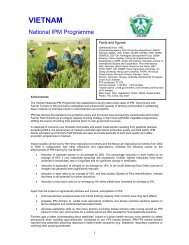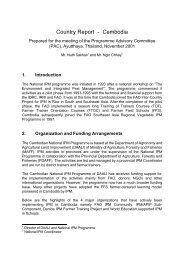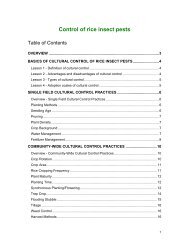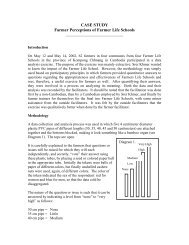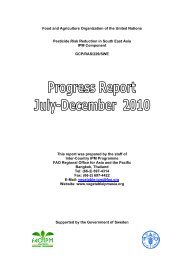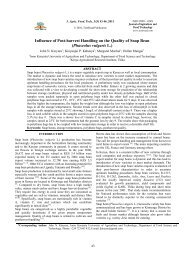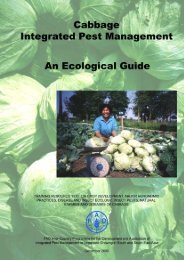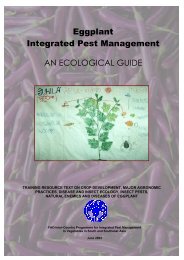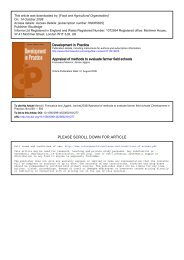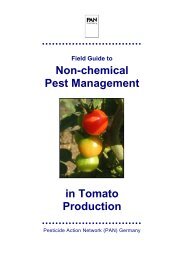All about potatoes.pdf - Vegetableipmasia.org
All about potatoes.pdf - Vegetableipmasia.org
All about potatoes.pdf - Vegetableipmasia.org
You also want an ePaper? Increase the reach of your titles
YUMPU automatically turns print PDFs into web optimized ePapers that Google loves.
3.<br />
SOIL<br />
• Rainfall - Rain causes washing off of nutrients and reduces their availability.<br />
• Soil pH - Low pH causes the soil to release certain nutrients making their content<br />
too high and poisonous to plants. High pH causes certain nutrients to be tightly<br />
bonded by the soil, making them unavailable as plant nutrients.<br />
3.2.2 Types and functions of nutrients<br />
Nutrients are grouped into two types:<br />
• Macro nutrients - these are nutrients potato plants require in large quantities.<br />
Macro nutrients are nitrogen, phosphorus, potassium, calcium and magnesium.<br />
• Micro nutrients - these are nutrients required in relatively small quantities. Some<br />
nutrients included in this group are boron, zinc, calcium, iron, etc. Even though<br />
they are only needed in small amounts, they are vital for supporting plant growth.<br />
Many micro nutrients are found in <strong>org</strong>anic fertilizer.<br />
Common functions of macro nutrients are described below:<br />
A. Nitrogen (N)<br />
Function:<br />
• Stimulates plant growth and enlarges leaves and tubers.<br />
• A component of chlorophyll helping plants to absorb sunlight and produce<br />
carbohydrates.<br />
• Increases tuber protein content.<br />
Important points:<br />
• Required in larger quantities than any other elements.<br />
• N-containing compounds are very unstable and hence easily lost from soil through<br />
washing off, evaporation and <strong>org</strong>anic/microbial activity.<br />
• Potato crops need N particularly during the vegetative growth, tuber initiation and<br />
tuber bulking stages.<br />
B. Phosphorus (P)<br />
Function:<br />
• Plays a part in chemical processes in plant growth.<br />
• Encourages root and tuber development.<br />
Important points:<br />
• P is very stable, but bonds tightly to soil particles making it quite insoluble in soil<br />
water and difficult for plants to absorb.<br />
• Very high P content can poison and kill plants.<br />
• Potato plants need P particularly during the vegetative growth and tuber initiation<br />
stages.<br />
C. Potassium (K)<br />
Function:<br />
• Stimulates leaf growth.<br />
• Stimulates tuber growth and enlarges tubers.<br />
• Plays a part in producing proteins.<br />
• Counteracts the effects of excessive application of P.<br />
• Increases resistance to disease.<br />
• Improves tuber quality, reduces sugar content and improves storability.<br />
8<br />
ALL ABOUT POTATOES



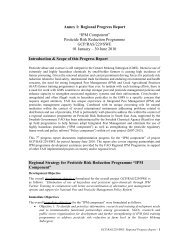
![Section 4 [ PDF file, 252 KB] - The Field Alliance](https://img.yumpu.com/51387260/1/158x260/section-4-pdf-file-252-kb-the-field-alliance.jpg?quality=85)
